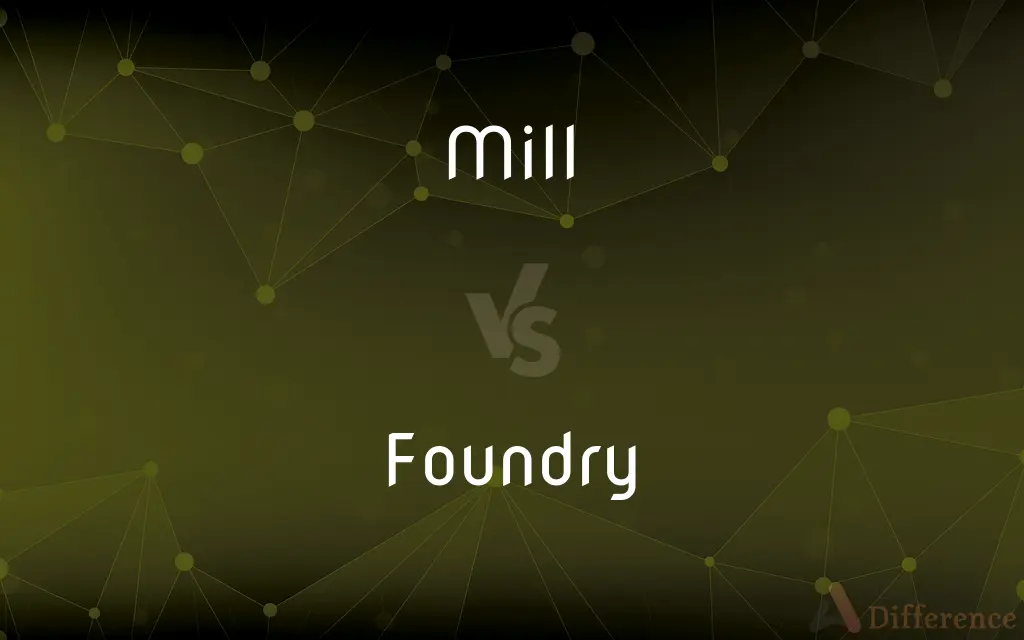Mill vs. Foundry — What's the Difference?
By Maham Liaqat & Urooj Arif — Updated on April 4, 2024
A mill processes raw materials into finished or semi-finished products, often involving rolling or grinding, while a foundry melts and casts metal into shapes using molds.

Difference Between Mill and Foundry
Table of Contents
ADVERTISEMENT
Key Differences
Mills are facilities where various raw materials, such as grains, wood, or metals, are processed into a more usable form. This processing often involves mechanical operations like grinding, rolling, or crushing to produce flour, lumber, or metal sheets. In contrast, foundries are specialized in the casting of metals. They melt metal materials and pour the liquid metal into molds to create castings of specific shapes and sizes, such as engine blocks or machine parts.
The primary focus of a mill is on the physical transformation of materials through mechanical means without altering the material’s fundamental properties. Foundries, however, focus on changing the state of the metal from solid to liquid and then back to solid in a new form, inherently altering its properties through the casting process.
Mills can operate in various industries, including agriculture, lumber, and metalworking, reflecting their versatility in processing different materials. Foundries are specifically tied to the metal industry, with their operations central to the production of metal components used in construction, automotive, aerospace, and machinery manufacturing.
The equipment used in mills includes grinders, rollers, and cutters, designed for material reduction and shaping. Foundries utilize furnaces for melting, molds for shaping, and post-processing equipment for finishing and testing the cast metal products.
Both mills and foundries play critical roles in the supply chain, converting raw resources into forms suitable for manufacturing and construction. However, their specific functions and the nature of their processes distinguish their contributions to industrial and economic activities.
ADVERTISEMENT
Comparison Chart
Main Function
Processing raw materials into usable forms
Casting metals into specific shapes using molds
Process Involved
Grinding, rolling, crushing
Melting, pouring, solidifying
Industry Focus
Agriculture, lumber, metalworking
Metal casting for automotive, aerospace, construction
Equipment Used
Grinders, rollers, cutters
Furnaces, molds, post-processing equipment
Material State Change
Physical transformation without altering base material
Changes from solid to liquid, then back to solid in new form
Role in Supply Chain
Converts raw materials for manufacturing and construction
Produces metal components for various industries
Compare with Definitions
Mill
A factory for cutting lumber or producing plywood.
The lumber mill supplies wood for building houses.
Foundry
Involves processes like mold making, melting, casting, and finishing.
After casting, the foundry also performs finishing to smooth the metal surfaces.
Mill
Involved in rolling steel into sheets or rods.
The steel mill produces sheets used in car bodies.
Foundry
A workshop or factory for casting metal.
The foundry casts iron parts for machinery.
Mill
Can refer to a machine that grinds or disperses materials.
A coffee mill grinds beans into fine powder for brewing.
Foundry
Specializes in melting and pouring metal into molds.
Bronze statues are often created in a foundry.
Mill
A facility for grinding grain into flour.
The old water mill has been grinding wheat into flour for centuries.
Foundry
Produces castings for automotive engines and frames.
The automotive industry relies heavily on foundries for parts.
Mill
A plant where ore is crushed and metals are extracted or refined.
The copper mill processes ore from the nearby mine.
Foundry
Utilizes various metals, including iron, steel, and aluminum.
The foundry specializes in aluminum casting for lightweight components.
Mill
A building equipped with machinery for grinding grain into flour.
Foundry
A foundry is a factory that produces metal castings. Metals are cast into shapes by melting them into a liquid, pouring the metal into a mold, and removing the mold material after the metal has solidified as it cools.
Mill
A factory fitted with machinery for a particular manufacturing process
A steel mill
A mill town
Foundry
An establishment where metal objects are made by melting metal and pouring it into molds.
Mill
An engine.
Foundry
The skill or operation of founding.
Mill
A boxing match or a fist fight.
Foundry
The castings made by founding.
Mill
A monetary unit used only in calculations, worth one thousandth of a dollar.
Foundry
A facility that melts metals in special furnaces and pours the molten metal into molds to make products. Foundries are usually specified according to the type of metal dealt with: iron foundry, brass foundry, etc.
Mill
Grind (something) in a mill
Hard wheats are easily milled into white flour
Foundry
The act, process, or art of casting metals; founding.
Mill
Cut or shape (metal) with a rotating tool
In the machine shop we mill and grind the castings
Foundry
A plant that produces chips out of semiconductors in the microelectronics industry.
Mill
(of people or animals) move around in a confused mass
Tourists were milling about in the lobby
Foundry
The act, process, or art of casting metals.
Mill
Thicken (wool or another animal fibre) by fulling it
Ordinary wool blankets are made by milling a woven wool fabric
Foundry
The buildings and works for casting metals.
Mill
A building equipped with machinery for grinding grain into flour or meal.
Foundry
Factory where metal castings are produced
Mill
A device or mechanism that grinds grain.
Mill
A building or farm equipped with machinery that presses or grinds fruit to extract the juice
A cider mill.
Mill
A device or machine used to extract juice from fruit.
Mill
A machine or device that reduces a solid or coarse substance into pulp or minute grains by crushing, grinding, or pressing
A pepper mill.
Mill
A building or group of buildings equipped with machinery for processing raw materials into finished or industrial products
A textile mill.
A steel mill.
Mill
A machine, such as one for stamping coins, that produces something by the repetition of a simple process.
Mill
A steel roller bearing a raised design, used for making a die or a printing plate by pressure.
Mill
Any of various machines for shaping, cutting, polishing, or dressing metal surfaces.
Mill
A process, agency, or institution that operates in a mechanical way or turns out products in the manner of a factory
The college was nothing more than a diploma mill.
Mill
A business that breeds and sells animals, such as purebred puppies, often in substandard conditions. Often used in combination
A puppy mill.
Mill
A difficult or laborious series of experiences
Went through the mill trying to get approval to build an addition onto the house.
Mill
A unit of currency equal to 1/1000 of a US dollar or 1/10 of a cent.
Mill
To grind, pulverize, or break down into smaller particles in a mill
Mill grain.
Mill
To produce or process mechanically in a mill
Mill steel.
Mill
To cut, shape, or finish in a mill or with a milling tool
Logs that are milled for lumber.
Mill
To produce a ridge around the edge of (a coin).
Mill
To groove or flute the rim of (a coin or other metal object).
Mill
Western US To cause (cattle) to move in a circle or tightening spiral in order to stop a stampede.
Mill
To move around in churning confusion
"A crowd of school children milled about on the curb looking scared" (Anne Tyler).
Mill
(Slang) To fight with the fists; box.
Mill
To undergo milling
Grain that mills well.
Mill
A grinding apparatus for substances such as grains, seeds, etc.
Pepper mill
Pepper has a stronger flavor when it is ground straight from a mill.
Mill
The building housing such a grinding apparatus.
My grandfather worked in a mill.
Mill
A machine used for expelling the juice, sap, etc., from vegetable tissues by pressure, or by pressure in combination with a grinding, or cutting process.
A cider mill; a cane mill
Mill
A machine for grinding and polishing.
A lapidary mill
Mill
A milling machine for machining of solid metal, wood, or plastic.
Lathes, mills, and drill presses
Mill
The raised or ridged edge or surface made in milling anything, such as a coin or screw.
Mill
A manufacturing plant for paper, steel, textiles, etc.
Mill
A building housing such a plant.
Mill
(figurative) An establishment that handles a certain type of situation or procedure routinely, or produces large quantities of an item without much regard to quality, such as a divorce mill, a puppy mill, etc.
Mill
An institution awarding educational certificates not officially recognised
Mill
(informal) An engine.
Mill
(informal) A boxing match, fistfight.
Mill
(die sinking) A hardened steel roller with a design in relief, used for imprinting a reversed copy of the design in a softer metal, such as copper.
Mill
(mining) An excavation in rock, transverse to the workings, from which material for filling is obtained.
Mill
(mining) A passage underground through which ore is shot.
Mill
A milling cutter.
Mill
(historical) A prison treadmill.
Mill
A typewriter used to transcribe messages received.
Mill
An obsolete coin worth one thousandth of a US dollar, or one tenth of a cent.
Mill
One thousandth part, particularly in millage rates of property tax.
Mill
A line of three matching pieces in nine men's morris and related games.
Mill
(trading card games) Discarding a card from one's deck.
Mill
(trading card games) A strategy centered on depleting the opponent's deck.
Mill
(transitive) To grind or otherwise process in a mill or other machine.
To mill flour
Mill
(transitive) To shape, polish, dress or finish using a machine.
Mill
(transitive) To engrave one or more grooves or a pattern around the edge of (a cylindrical object such as a coin).
Mill
To move about in an aimless fashion.
I didn't have much to do, so I just milled around the town looking at the shops.
Mill
(transitive) To cause to mill, or circle around.
To mill cattle
Mill
To swim underwater.
Mill
To swim suddenly in a new direction.
Mill
To beat; to pound.
Mill
To pass through a fulling mill; to full, as cloth.
Mill
(transitive) To roll (steel, etc.) into bars.
Mill
(transitive) To make (drinking chocolate) frothy, as by churning.
Mill
(intransitive) To undergo hulling.
This maize mills well.
Mill
To take part in a fistfight; to box.
Mill
To fill (a winze or interior incline) with broken ore, to be drawn out at the bottom.
Mill
To commit burglary.
Mill
To move (a card) from a deck to the discard pile.
Mill
To destroy (a card) due to having a full hand.
Mill
A money of account of the United States, having the value of the tenth of a cent, or the thousandth of a dollar.
Mill
A machine for grinding or comminuting any substance, as grain, by rubbing and crushing it between two hard, rough, or indented surfaces; as, a gristmill, a coffee mill; a bone mill.
Mill
A machine used for expelling the juice, sap, etc., from vegetable tissues by pressure, or by pressure in combination with a grinding, or cutting process; as, a cider mill; a cane mill.
Mill
A machine for grinding and polishing; as, a lapidary mill.
Mill
A common name for various machines which produce a manufactured product, or change the form of a raw material by the continuous repetition of some simple action; as, a sawmill; a stamping mill, etc.
Mill
A building or collection of buildings with machinery by which the processes of manufacturing are carried on; as, a cotton mill; a powder mill; a rolling mill.
Mill
A hardened steel roller having a design in relief, used for imprinting a reversed copy of the design in a softer metal, as copper.
Mill
An excavation in rock, transverse to the workings, from which material for filling is obtained.
Mill
A milling cutter. See Illust. under Milling.
Mill
A pugilistic encounter.
Mill
Short for Treadmill.
Mill
The raised or ridged edge or surface made in milling anything, as a coin or screw.
Mill
A building or complex of buildings containing a mill{1} or other machinery to grind grains into flour.
Mill
To reduce to fine particles, or to small pieces, in a mill; to grind; to comminute.
Mill
To shape, finish, or transform by passing through a machine; specifically, to shape or dress, as metal, by means of a rotary cutter.
Mill
To make a raised border around the edges of, or to cut fine grooves or indentations across the edges of, as of a coin, or a screw head; also, to stamp in a coining press; to coin.
Mill
To pass through a fulling mill; to full, as cloth.
Mill
To beat with the fists.
Mill
To roll into bars, as steel.
Mill
To swim under water; - said of air-breathing creatures.
Mill
To undergo hulling, as maize.
Mill
To move in a circle, as cattle upon a plain; to move around aimlessly; - usually used with around.
The deer and the pig and the nilghar were milling round and round in a circle of eight or ten miles radius.
Mill
To swim suddenly in a new direction; - said of whales.
Mill
To take part in a mill; to box.
Mill
To fill (a winze or interior incline) with broken ore, to be drawn out at the bottom.
Mill
To cause to mill, or circle round, as cattle.
Mill
A plant consisting of buildings with facilities for manufacturing
Mill
Scottish philosopher who expounded Bentham's utilitarianism; father of John Stuart Mill (1773-1836)
Mill
English philosopher and economist remembered for his interpretations of empiricism and utilitarianism (1806-1873)
Mill
Machine that processes materials by grinding or crushing
Mill
The act of grinding to a powder or dust
Mill
Move about in a confused manner
Mill
Grind with a mill;
Mill grain
Mill
Produce a ridge around the edge of;
Mill a coin
Mill
Roll out (metal) with a rolling machine
Common Curiosities
Can both mills and foundries handle metals?
Yes, but in different ways: mills may roll or grind metal, whereas foundries melt and cast it.
Is recycling a part of the process for mills or foundries?
Foundries often recycle scrap metal for casting, while mills can recycle certain materials like metal scraps or sawdust, depending on the industry.
What is the significance of mills and foundries in manufacturing?
They are essential in the supply chain, converting raw resources into materials and components for further manufacturing and construction.
Can the processes in a foundry affect the properties of the cast metal?
Yes, the casting process, including the rate of cooling and the composition of the mold, can significantly affect the mechanical properties of the metal.
Are mills only involved in food production?
No, mills work across various industries, including food, lumber, and metals, to process different materials.
What is the main difference between a mill and a foundry?
A mill processes materials into usable forms through mechanical means, while a foundry casts metals into shapes by melting and molding.
How has technology impacted mills and foundries?
Advances in technology have improved efficiency, safety, and environmental sustainability in both mills and foundries, from automated milling machines to more efficient furnaces and pollution control in foundries.
What kinds of products come from a foundry?
Foundries produce metal parts like automotive components, machinery parts, and construction materials.
How do foundries ensure the quality of their castings?
Foundries use post-processing treatments, including heat treating and finishing, to ensure the casting meets specified quality standards.
What role do mills and foundries play in the circular economy?
Both are crucial in recycling and repurposing materials, contributing to sustainability by reducing waste and conserving resources.
Share Your Discovery

Previous Comparison
Coma vs. Syncope
Next Comparison
Lodestar vs. PolarisAuthor Spotlight
Written by
Maham LiaqatCo-written by
Urooj ArifUrooj is a skilled content writer at Ask Difference, known for her exceptional ability to simplify complex topics into engaging and informative content. With a passion for research and a flair for clear, concise writing, she consistently delivers articles that resonate with our diverse audience.














































